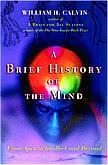|
COPY-AND-PASTE CITATION William H. Calvin, "When Climate Staggers: Civilizationís Vulnerabilities to Sudden Change." The 2004 Adamson lecture in International Studies at Westminster College in Salt Lake City (25 March 2004). See also http://WilliamCalvin.com/2004/staggers.htm |
William H.
Calvin |
|
When
Climate Staggers:
Coming on stage now is a stunning example of how civilization must rescue itself. It dwarfs the three big scientific alerts from the 1970s about global warming, ozone loss, and acid rain. But until the 1990s, no one knew much about abrupt climate change, those past occasions when the whole world flipped out of a warm-and-wet climate like todayís into the alternate mode, which is like a worldwide version of the Oklahoma Dust Bowl of the 1930s. There are big alterations in only 3-5 years. A few centuries later, the drought climate flips back into worldwide warm-and-wet, even more quickly.
Unlike greenhouse warmings, the big flips have happened every few thousand years on average, though the most recent one was back before agriculture in 10,000 B.C. The next flip may arrive sooner than otherwise, thanks to our current warming trend. The northern extension of the Gulf Stream appears quite vulnerable to global warming in four different ways, and its collapse affects the climate worldwide. An early warning might be a decline in this current. And according to two recent oceanographic studies, this vulnerable current has been dramatically declining for the last 50 years, paralleling our global warming and rising CO2. Other sudden shocks also need to be prevented: When the Indonesian currency collapsed in 1997, there was a lot of starvation despite good growing conditions for food. In our era of 24/7 markets, many of the buffers to sudden change have been bypassed. It is also the era of transportation systems that spread pests and diseases around the globe in only a day, far faster than public health efforts can cope with them. The issue isnít speed per se. It is relative speed, when one process is nimble and another ponderous. Because it takes decades to achieve consensus and begin to act (consider the history of greenhouse warming), we are particularly vulnerable to nimble forces, whether they come from the climate, economy, or disease. While we can imagine civilization coping with slow change, it clearly needs shoring up against the various lurches. William H. Calvin, Ph.D., is a professor at the University of Washington and the author of such books as A Brain for All Seasons: Human Evolution and Abrupt Climate Change (winner of the Phi Beta Kappa book prize) and, in March 2004, A Brief History of the Mind: From Apes to Intellect and Beyond.
The Virtual Index for my books and articles, far better than my printed index in most cases: other authors' books (and who has quoted them):
|
A Brief History of the Mind, 2004 Lingua ex Machina 2000 The Cerebral Code 1996 How Brains Think 1996 |







